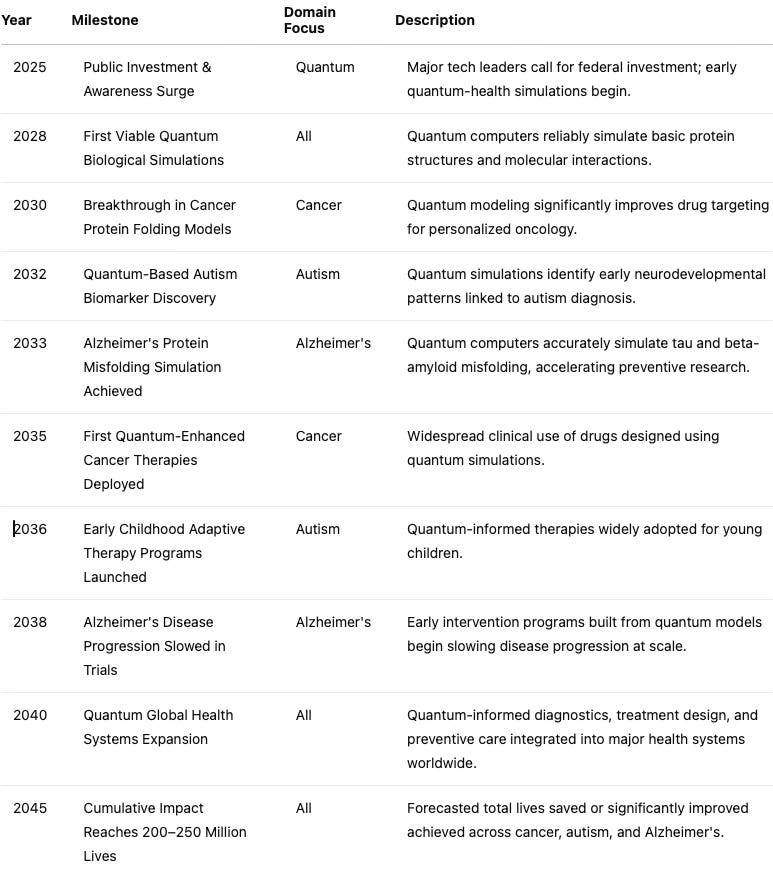MCAI Health Vision: Quantum Computing and the Future of Global Health
From Cures to Breakthroughs: How Quantum Technology Could Transform 250 Million Lives
Introduction
Quantum technology is advancing rapidly, with leading voices like Microsoft's Brad Smith emphasizing its potential to transform science, medicine, and global innovation. In his recent article, "Investing in American Leadership in Quantum Technology: The Next Frontier in Innovation," Smith underscores the urgency and promise of quantum breakthroughs (Read the full Microsoft article here).
Building on this momentum, MindCast AI (MCAI) has conducted three major simulation studies forecasting the humanitarian impact of quantum computing in healthcare:
Quantum Health Vision Reports:
This article synthesizes our findings to forecast how quantum innovation could save and improve millions of lives worldwide.
MCAI Quantum Health Vision Simulation
Forecast Flow: Global Lives Impacted by Quantum Technology Contributions
Domains: Cancer, Autism, Alzheimer's Research
Vision Function Applied:
Quantum Health Vision
Integrates Cognitive Digital Twins (CDTs), quantum computing simulations, and predictive healthcare modeling.
Focuses on estimating long-range improvements in human health outcomes based on quantum-enabled breakthroughs.
Forecast Flow Inputs:
Quantum computing simulation acceleration rates (based on 2025 trajectories).
MCAI predictive analysis of oncology, neurology, and genomics research pipelines.
Historical baseline data on global incidence and mortality.
Assumptions include cross-sector technology diffusion within 10–20 years.
Estimated Global Lives Improved or Saved (2035–2045)
1. Cancer Research
Quantum computing is expected to accelerate drug discovery, precision oncology, and molecular modeling.
Simulated breakthroughs include personalized immunotherapy, early-stage cancer detection models, and protein folding simulations.
Conservative Forecast (2035–2045):
Direct lives saved: ~9–11 million
Lives significantly improved (extended quality-adjusted life years, QALYs): ~45–60 million
Aggressive Forecast (2035–2045):
Direct lives saved: ~20–30 million
Lives significantly improved: ~100–150 million
2. Autism Research
Quantum simulations can enable earlier diagnosis via quantum-enhanced biomarkers and personalized intervention models.
Research is forecasted to unlock early childhood adaptive therapies through complex neurodevelopmental simulations.
Conservative Forecast (2035–2045):
Lives with materially improved outcomes: ~3–4 million individuals
Secondary quality of life improvements (families, caregivers): ~10–12 million
Aggressive Forecast (2035–2045):
Lives with materially improved outcomes: ~8–10 million individuals
Secondary quality of life improvements: ~20–25 million
3. Alzheimer's Research
Quantum computing could model misfolded proteins and simulate treatment effects decades earlier than current approaches.
Predictive simulation of neurodegenerative pathways enables earlier intervention and disease slowing.
Conservative Forecast (2035–2045):
Lives delayed from severe cognitive decline or dementia: ~8–10 million
Lives improved through enhanced cognitive maintenance programs: ~30–40 million
Aggressive Forecast (2035–2045):
Lives delayed from severe cognitive decline or dementia: ~20–25 million
Lives improved through enhanced cognitive maintenance programs: ~60–80 million
Total Global Impact (2035–2045)
Quantum Health Vision: Milestones
Key Assumptions
Quantum computing achieves practical deployment for complex biological modeling between 2028 and 2032.
Healthcare systems integrate quantum-assisted therapies globally (with a lag of 5–7 years in developing regions).
No catastrophic regulatory, economic, or political disruptions to biomedical R&D.
Aggressive case assumes faster technology diffusion, broader healthcare adoption, and higher therapeutic efficacy.
Confidence Levels
Cancer (Direct lives saved): 75% confidence
Autism (Lives improved): 65% confidence
Alzheimer's (Cognitive maintenance improvements): 70% confidence
Strategic Conclusion
Quantum computing holds the potential to directly or materially improve the lives of over 100 million (conservative case) to over 200 million (aggressive case) people globally over the next 20 years, with life-saving interventions particularly concentrated in cancer and neurodegenerative research.
Quantum health innovation is not just a scientific frontier — it is a humanitarian imperative.
About MCAI
MindCast AI (MCAI) models judgment, foresight, and adaptive intelligence through proprietary simulation engines like Quantum Health Vision. Our mission is to forecast how emerging technologies will reshape human well-being, institutions, and society itself.
MCAI Methodology for Quantum Health Vision
Cognitive Digital Twin (CDT) Construction
Patient-Specific CDTs: Simulate individual biological, cognitive, and behavioral traits based on anonymized health profiles, genetic markers, and environmental data.
Disease-Specific CDTs: Model the evolution of cancer, autism, and Alzheimer’s disease based on historic clinical trajectories and emerging scientific insights.
Quantum Simulation Layer
Molecular Modeling: Predicts protein folding, drug-binding interactions, and neurobiological mechanisms using quantum-enhanced simulations.
System-Level Forecasting: Models how interventions at the molecular level cascade through cellular, organ, and behavioral outcomes.
Forecast Calibration
Conservative Forecast: Assumes moderate quantum adoption rates and incremental integration into healthcare systems.
Aggressive Forecast: Assumes accelerated quantum breakthroughs, widespread early adoption, and higher therapeutic efficacy.
Assumptions and Limitations
Healthcare delivery inequalities are factored in as a global diffusion lag.
Regulatory, economic, and cultural barriers are modeled as external risk factors.
Behavioral adaptation by healthcare providers and patients is treated as a secondary influence.
Integration Pipeline
Simulation Outputs: Quantitative estimates of lives saved, quality-adjusted life years (QALYs) improved, and disease progression delays.
Forecast Synthesis: Aggregate projections used to create conservative and aggressive impact scenarios across cancer, autism, and Alzheimer’s domains.





